The Old Curiosity Club discussion
David Copperfield
>
DC, Chp. 19-21
I don't know the artist:
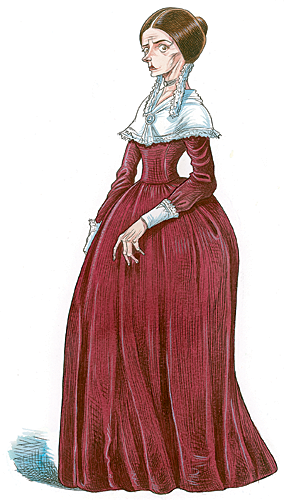
She was a little dilapidated – like a house – with having been so long to let; yet had, as I have said, an appearance of good looks. Her thinness seemed to be the effect of some wasting fire within her, which found a vent in her gaunt eyes.

She was a little dilapidated – like a house – with having been so long to let; yet had, as I have said, an appearance of good looks. Her thinness seemed to be the effect of some wasting fire within her, which found a vent in her gaunt eyes.
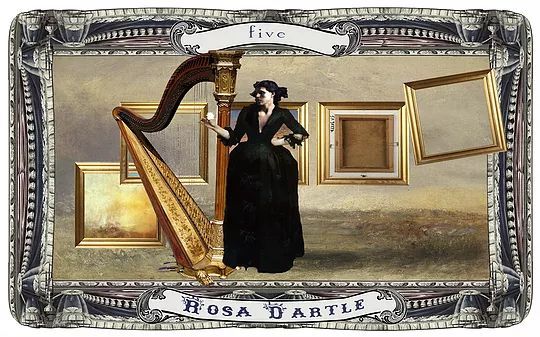
Below this it says "The Dickens Tarot by Chris Leech, 5 of Water". I don't know what that means.
To go along with that (I guess) we have 4 of water:
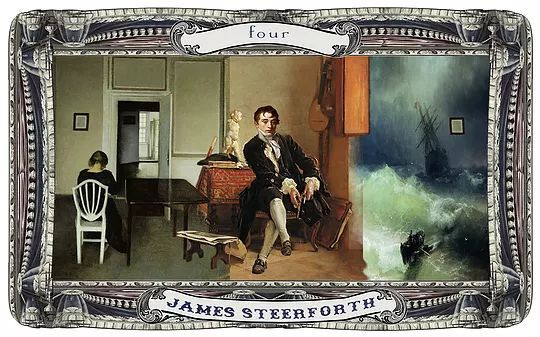
I am often amazed that I have no idea what people are talking about. This is one of those times.
This doesn't exactly go with this thread, but it goes with the other water illustrations:
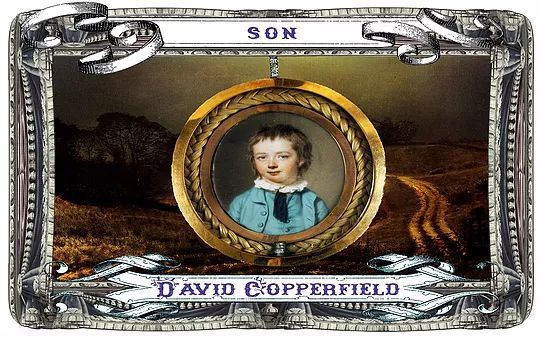
And finally, I think, water wraps up with:
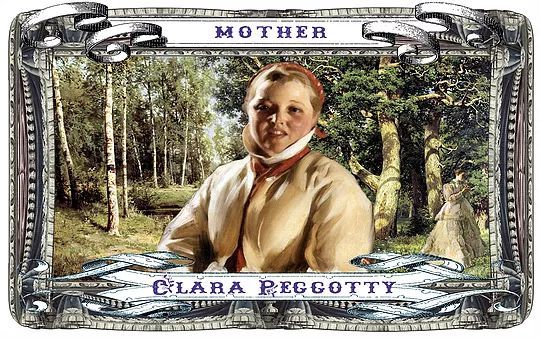
I wonder how Peggotty got to be the mother of water when she wasn't a mother.
Good news! We have fire! Four of Fire is:
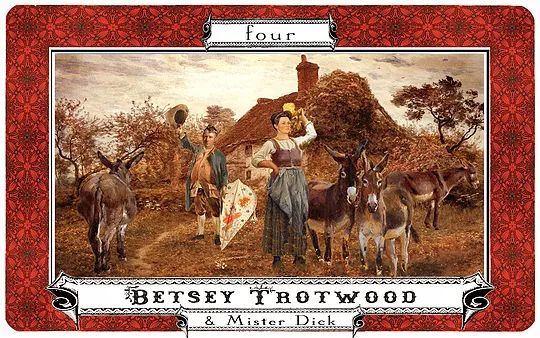
And our only other fire, who we haven't gotten around to yet is:
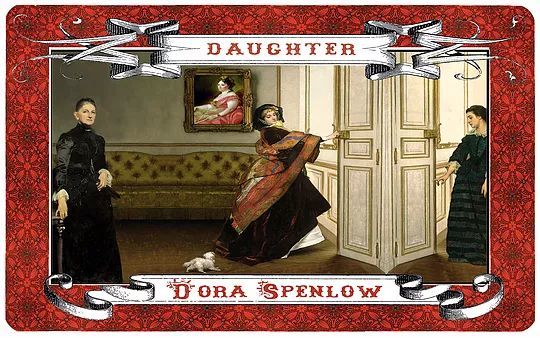
There are more Fires but they are for different books. I'm confused.

And our only other fire, who we haven't gotten around to yet is:

There are more Fires but they are for different books. I'm confused.
Somerset Maugham says of Rosa Dartle:
“the most baffling character in David Copperfield is Rosa Dartle. I suspect that Dickens meant to make greater use of her in the story than he did and if he did not do so, it was because he feared to offend the public. I can only suppose that Steerforth had been her lover and she hated him because he abandoned her but not withstanding loved him still with a jealous, hungry, vindictive love. Dickens here invented a character that Blazac would have made much of.”
More about Dickens women:
As Compton-Rickett has pointed out:
“With another type of woman Dickens is far more successful. With women past their first youth, who are eccentric in their ways, who have little or no physical charm, and often no mental brilliance, yet who have a certain soundness and goodness of heart; with women of this type Dickens is extraordinarily happy.” Betsey Trotwood, Mrs. Micawber, Miss Peggotty and Clara Copperfield are noteworthy examples of this in the novel David Copperfield.
“the most baffling character in David Copperfield is Rosa Dartle. I suspect that Dickens meant to make greater use of her in the story than he did and if he did not do so, it was because he feared to offend the public. I can only suppose that Steerforth had been her lover and she hated him because he abandoned her but not withstanding loved him still with a jealous, hungry, vindictive love. Dickens here invented a character that Blazac would have made much of.”
More about Dickens women:
As Compton-Rickett has pointed out:
“With another type of woman Dickens is far more successful. With women past their first youth, who are eccentric in their ways, who have little or no physical charm, and often no mental brilliance, yet who have a certain soundness and goodness of heart; with women of this type Dickens is extraordinarily happy.” Betsey Trotwood, Mrs. Micawber, Miss Peggotty and Clara Copperfield are noteworthy examples of this in the novel David Copperfield.
Jantine wrote: "It is clear David is still way too naieve.
Also, is it me, or are there a lot of hints of Steerforth being gay? There were the creepy remarks of how he wished David had a sister, and then he'd know..."
When I was young I had a friend who was a boy, but never a boy friend. We grew up together and had one of those brother/sister type of relationship. As we became teenagers he became very popular among other teenagers, he was very good at sports, was involved with music having a wonderful bass voice, and did very well in all those classes I hated. He moved into the popular crowd which I had nothing at all to do with, but we remained friends from growing up together. As time went by my boyfriend made a comment about this friend of mine being gay. I was shocked at the thought and asked him if he really thought my friend was gay, and my boyfriend told me he thought my friend loved being popular so much he would sleep with anyone who gave him enough attention, male or female. I don't believe it, but I've often thought of it through the years, that's what Steerforth and David remind me of.
Also, is it me, or are there a lot of hints of Steerforth being gay? There were the creepy remarks of how he wished David had a sister, and then he'd know..."
When I was young I had a friend who was a boy, but never a boy friend. We grew up together and had one of those brother/sister type of relationship. As we became teenagers he became very popular among other teenagers, he was very good at sports, was involved with music having a wonderful bass voice, and did very well in all those classes I hated. He moved into the popular crowd which I had nothing at all to do with, but we remained friends from growing up together. As time went by my boyfriend made a comment about this friend of mine being gay. I was shocked at the thought and asked him if he really thought my friend was gay, and my boyfriend told me he thought my friend loved being popular so much he would sleep with anyone who gave him enough attention, male or female. I don't believe it, but I've often thought of it through the years, that's what Steerforth and David remind me of.
Kim wrote: "Somerset Maugham says of Rosa Dartle:
“the most baffling character in David Copperfield is Rosa Dartle. I suspect that Dickens meant to make greater use of her in the story than he did and if he d..."
I can see the logic of Maugham’s comments. Rosa could easily slip over the line of acceptable Victorian standards. Maybe later in the novel she will bend that line even more.
“the most baffling character in David Copperfield is Rosa Dartle. I suspect that Dickens meant to make greater use of her in the story than he did and if he d..."
I can see the logic of Maugham’s comments. Rosa could easily slip over the line of acceptable Victorian standards. Maybe later in the novel she will bend that line even more.
Kim wrote: "Tristram wrote: "I am growing more and more conservative every day and more and more inclined to think the world, as it is today, a madhouse."
If that's what conservative is, I'm about as conserva..."
Well, I'd say that conservatism means being on the right side of the fence when it comes to madness ;-)
If that's what conservative is, I'm about as conserva..."
Well, I'd say that conservatism means being on the right side of the fence when it comes to madness ;-)
Kim wrote: "I don't know the artist:
She was a little dilapidated – like a house – with having been so long to let; yet had, as I have said, an appearance of good looks. Her thinness seemed to be the effect..."
I like the artist's style even though I would not think Miss Dartle that old-looking.
She was a little dilapidated – like a house – with having been so long to let; yet had, as I have said, an appearance of good looks. Her thinness seemed to be the effect..."
I like the artist's style even though I would not think Miss Dartle that old-looking.
Kim wrote: "There's also an Earth section (of course) but David Copperfield didn't make it. Here's one just for Tristram:
"
Is that Queen Victoria? ;-)
"
Is that Queen Victoria? ;-)
Kim wrote: "Somerset Maugham says of Rosa Dartle:
“the most baffling character in David Copperfield is Rosa Dartle. I suspect that Dickens meant to make greater use of her in the story than he did and if he d..."
Like Peter, I can see Maugham's point, and maybe this is why I enjoy Miss Dartle as a character - much more than the Micawbers, for instance.
“the most baffling character in David Copperfield is Rosa Dartle. I suspect that Dickens meant to make greater use of her in the story than he did and if he d..."
Like Peter, I can see Maugham's point, and maybe this is why I enjoy Miss Dartle as a character - much more than the Micawbers, for instance.
Kim wrote: "Jantine wrote: "It is clear David is still way too naieve.
Also, is it me, or are there a lot of hints of Steerforth being gay? There were the creepy remarks of how he wished David had a sister, an..."
Yes. Yes, I think that's it, completely!
Also, is it me, or are there a lot of hints of Steerforth being gay? There were the creepy remarks of how he wished David had a sister, an..."
Yes. Yes, I think that's it, completely!
Tristram wrote: "Kim wrote: ".Well, I'd say that conservatism means being on the right side of the fence when it comes to madness ;-).."
I agree, especially lately.
I agree, especially lately.
From The Life of Charles Dickens by John Forster:
In all the latter part of the year Dickens's thoughts were turning much to the form his next book should assume. A suggestion that he should write it in the first person, by way of change, had been thrown out by me, which he took at once very gravely; and this, with other things, though as yet not dreaming of any public use of his own personal and private recollections, conspired to bring about that resolve. The determination once taken, with what a singular truthfulness he contrived to blend the fact with the fiction may be shown by a small occurrence of this time. It has been inferred, from the vividness of the boy-impressions of Yarmouth in David's earliest experiences, that the place must have been familiar to his own boyhood: but the truth was that at the close of 1848 he first saw that celebrated sea-port. One of its earlier months had been signalised by an adventure in which Leech, Lemon, and myself took part with him, when, obtaining horses from Salisbury, we passed the whole of a March day in riding over every part of the Plain; visiting Stonehenge, and exploring Hazlitt's "hut" at Winterslow, birthplace of some of his finest essays; altogether with so brilliant a success that now (13th of November) he proposed to "repeat the Salisbury Plain idea in a new direction in mid-winter, to wit, Blackgang Chine in the Isle of Wight, with dark winter cliffs and roaring oceans." But mid-winter brought with it too much dreariness of its own, to render these stormy accompaniments to it very palatable; and on the last day of the year he bethought him "it would be better to make an outburst to some old cathedral city we don't know, and what do you say to Norwich[462] and Stanfield-hall?" Thither accordingly the three friends went, illness at the last disabling me; and of the result I heard (12th of January, 1849) that Stanfield-hall, the scene of a recent frightful tragedy, had nothing attractive unless the term might be applied to "a murderous look that seemed to invite such a crime. We arrived," continued Dickens, "between the Hall and Potass farm, as the search was going on for the pistol in a manner so consummately stupid, that there was nothing on earth to prevent any of Rush's labourers from accepting five pounds from Rush junior to find the weapon and give it to him. Norwich, a disappointment" (one pleasant face "transformeth a city," but he was unable yet to connect it with our delightful friend Elwin); "all save its place of execution, which we found fit for a gigantic scoundrel's exit. But the success of the trip, for me, was to come. Yarmouth, sir, where we went afterwards, is the strangest place in the wide world: one hundred and forty-six miles of hill-less marsh between it and London. More when we meet. I shall certainly try my hand at it." He made it the home of his "little Em'ly."
In all the latter part of the year Dickens's thoughts were turning much to the form his next book should assume. A suggestion that he should write it in the first person, by way of change, had been thrown out by me, which he took at once very gravely; and this, with other things, though as yet not dreaming of any public use of his own personal and private recollections, conspired to bring about that resolve. The determination once taken, with what a singular truthfulness he contrived to blend the fact with the fiction may be shown by a small occurrence of this time. It has been inferred, from the vividness of the boy-impressions of Yarmouth in David's earliest experiences, that the place must have been familiar to his own boyhood: but the truth was that at the close of 1848 he first saw that celebrated sea-port. One of its earlier months had been signalised by an adventure in which Leech, Lemon, and myself took part with him, when, obtaining horses from Salisbury, we passed the whole of a March day in riding over every part of the Plain; visiting Stonehenge, and exploring Hazlitt's "hut" at Winterslow, birthplace of some of his finest essays; altogether with so brilliant a success that now (13th of November) he proposed to "repeat the Salisbury Plain idea in a new direction in mid-winter, to wit, Blackgang Chine in the Isle of Wight, with dark winter cliffs and roaring oceans." But mid-winter brought with it too much dreariness of its own, to render these stormy accompaniments to it very palatable; and on the last day of the year he bethought him "it would be better to make an outburst to some old cathedral city we don't know, and what do you say to Norwich[462] and Stanfield-hall?" Thither accordingly the three friends went, illness at the last disabling me; and of the result I heard (12th of January, 1849) that Stanfield-hall, the scene of a recent frightful tragedy, had nothing attractive unless the term might be applied to "a murderous look that seemed to invite such a crime. We arrived," continued Dickens, "between the Hall and Potass farm, as the search was going on for the pistol in a manner so consummately stupid, that there was nothing on earth to prevent any of Rush's labourers from accepting five pounds from Rush junior to find the weapon and give it to him. Norwich, a disappointment" (one pleasant face "transformeth a city," but he was unable yet to connect it with our delightful friend Elwin); "all save its place of execution, which we found fit for a gigantic scoundrel's exit. But the success of the trip, for me, was to come. Yarmouth, sir, where we went afterwards, is the strangest place in the wide world: one hundred and forty-six miles of hill-less marsh between it and London. More when we meet. I shall certainly try my hand at it." He made it the home of his "little Em'ly."
Here's Steerforth from the 1935 David Copperfield movie. He was played by Hugh Williams. What do you think?
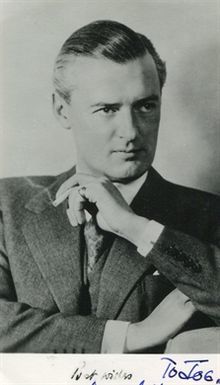

He looks at least twice as old as he should be. Isn't that a man in his fourties?
Jantine wrote: "He looks at least twice as old as he should be. Isn't that a man in his fourties?"
I just looked him up, he was born in 1904 and the movie was made in 1935 so that made him 31 at the time. Too old to be playing Steerforth, but he looks older than that in that picture. Here is a photo I found from the movie, he is with the actor who is playing the adult David. This is not how I picture the adult David. Oh, and people from the 1930s and 40s movies always look older than they are to me, I don't know why.
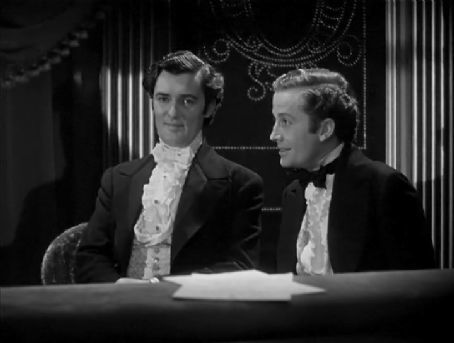
I just looked him up, he was born in 1904 and the movie was made in 1935 so that made him 31 at the time. Too old to be playing Steerforth, but he looks older than that in that picture. Here is a photo I found from the movie, he is with the actor who is playing the adult David. This is not how I picture the adult David. Oh, and people from the 1930s and 40s movies always look older than they are to me, I don't know why.

While I'm looking at 1935 DC photos, here is Uriah, David, and Aunt Betsey:
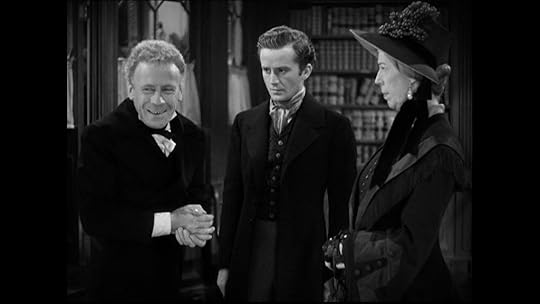
Uriah is never pictured, whether in movies or illustrations the age he should be. He can't be out of his 20s yet can he? When David first meets him he is 15. Now David is 17, wouldn't that make Uriah around 25?

Uriah is never pictured, whether in movies or illustrations the age he should be. He can't be out of his 20s yet can he? When David first meets him he is 15. Now David is 17, wouldn't that make Uriah around 25?
This will be easier. There are characters in the movie that, if they are in the book I don't remember them.
https://www.famousfix.com/topic/david...
https://www.famousfix.com/topic/david...
This is one of the reasons I usually stay clear of Dickens film adaptations: The actors impersonating the characters never really hit it, and I feel disappointed. Dickens's characters are so full of life and colour that I find it impossible for any real person to slip into them, which is quite a paradox, but nevertheless my feeling.
 Kim wrote: "https://www.famousfix.com/topic/david..."
Kim wrote: "https://www.famousfix.com/topic/david..."Quite a few famous names in that cast. Seeing the photos whets my appetite, and now I want to see that adaptation.
In the 1935 movie we have Elsa Lanchester as Clickett. Who is Clickett? I would think if she was important enough to make the movie I'd have at least some idea who she is.
 Kim wrote: "In the 1935 movie we have Elsa Lanchester as Clickett. Who is Clickett? I would think if she was important enough to make the movie I'd have at least some idea who she is."
Kim wrote: "In the 1935 movie we have Elsa Lanchester as Clickett. Who is Clickett? I would think if she was important enough to make the movie I'd have at least some idea who she is."I referred to David Perdue's Dickens Page (https://www.charlesdickenspage.com/in...) which is my Dickens Bible for reference. Clickett is the name of the "orfling" who worked for the Micawbers when David lived with them. I never would have remembered that.
Thanks Mary Lou, I never would have came up with her. I wonder what she did in the movie, she didn't do much in the book, not yet anyway.
Mary Lou wrote: "Kim wrote: "https://www.famousfix.com/topic/david..."
Quite a few famous names in that cast. Seeing the photos whets my appetite, and now I want to see that adaptation."
Talking about movies so much, and movies being my second passion after books, I searched the Internet for a site that is a bit like Goodreads for movies - and I came across letterboxd. I have just signed on there as DekeThornton, you know, the jaded guy from The Wild Bunch. I used to write lengthy film reviews and post them on the German Amazon site, as Tristram Shandy, but I am not going to take that up again. Still, it's nice to have a site where I can enter all the movies I watch.
Quite a few famous names in that cast. Seeing the photos whets my appetite, and now I want to see that adaptation."
Talking about movies so much, and movies being my second passion after books, I searched the Internet for a site that is a bit like Goodreads for movies - and I came across letterboxd. I have just signed on there as DekeThornton, you know, the jaded guy from The Wild Bunch. I used to write lengthy film reviews and post them on the German Amazon site, as Tristram Shandy, but I am not going to take that up again. Still, it's nice to have a site where I can enter all the movies I watch.
If you like movies, I think this is a site you could spend some interesting time on. This morning, I added a meaningless little review on Murder at the Gallop, but on the whole I try not to turn back to review writing on movies because if you start me on westerns or noir, there's no way I finish before the cows come home.
We are in the middle of a discussion of the dumbest movie we ever saw. There are so many stupid movies I've seen I'm having trouble deciding which one is on the bottom of the list.
My son doesn't agree with any of my choices, he likes to watch the ones I think are stupid, he says they are so dumb they are funny.
 Kim wrote: "My son doesn't agree with any of my choices, he likes to watch the ones I think are stupid, he says they are so dumb they are funny."
Kim wrote: "My son doesn't agree with any of my choices, he likes to watch the ones I think are stupid, he says they are so dumb they are funny."Well, there are stupid funny movies (the Vacation movies spring to mind), and just stupid, stupid movies. I turn those off, so I can't even tell you what they are. Stupid funny has its place, but I prefer clever funny, like Arsenic and Old Lace, or Harvey.
 I love movies also, esp. old movies. I love Arsenic and Old Lace, but then I love almost anything with Cary Grant, and Spencer Tracy, and Clark Gable, Need I go on? I will look for that site.
I love movies also, esp. old movies. I love Arsenic and Old Lace, but then I love almost anything with Cary Grant, and Spencer Tracy, and Clark Gable, Need I go on? I will look for that site.
Well when it comes to movies, anything Tristram loves I probably hate except for all his Westerns, I never told him this before, but I'm pretty sure I have never seen a Western movie. I'm not sure why. When I was a kid it seemed like the only television shows we got were Westerns, so maybe for a while they didn't make movies, I don't know.
Here is a review of the 1935 movie. Well, except for the part I cut out because it was a spoiler:
DAVID COPPERFIELD
All the important characters in Charles Dickens' immortal "David Copperfield" are now living on the Capitol screen, where the highlights of the widely read novel are to be seen in a tender, amusing and oft heart-rending screen version.
In order to get in enough material on the many masterfully-drawn characters of the book to make each one of them recognizable and as much a part of the warp and woof of the pictures as they were of Dickens' book, the adaptor, Hugh Walpole, the scenarist, Howard Estabrook and the director, George Cukor, had to make this an unusually long film. It runs, as it stands now, two hours and ten minutes.
That is much too long for an ordinary picture, but in the case of Metro-Goldwyn-Mayer's production of "David Copperfield" that length is justified by the results. there are several scenes that might have been shortened without injuring the story, but on the whole, the tale of David's joys and tribulations is absorbing enough to keep one intent on the film throughout.
One has to see the picture to appreciate the great and loving care that went into the production. The players selected for the various characters, with the possible exception of Roland Young as Uriah Heep, are as nearly perfect as a Dickens' fan could wish.
Little Freddie Bartholomew, who plays the child David, is an ideal selection and a real film find. He is destined for fame and may now be classed with the other important child players of the screen. He enters into the character of the young David so thoroughly that he makes the audience laugh with him at his joy in his mother's gay spirits and his interest in his beloved nurse's affair of the heart with the terse but friendly Barkis, and weep with him at his mother's untimely death and shudder at the cruel treatment he receives from his stern step-father, and delight in his friendship for the dignified Micawber and cheer when his eccentric aunt, Betsey Trotwood, takes him in to live with her and the smiling and simple Mr. Dick.
Frank Lawton, as the older David, gives a truly fine performance, as we see him meeting the flighty Dora for the first time and taking his friend Steerforth to visit the Peggottys. His friendship for Agnes and Mr. Wickfield is also touched upon.
Jessie Ralph is tender and loving as Peggotty. W.C. Fields' selection as Micawber was an inspiration on the part of the producers. Edna Mae Oliver's Aunt Betsy is one of the outstanding characterization of the film, and Maureen O'Sullivan, as Dora, Madge Evans as Agnes and Elizabeth Allan as David's mother give satisfaction in their various roles. Basil Rathbone is excellent as the hard-hearted Murdstone and Violet Kemble-Cooper, thoroughly disguised in a black wig and heavy dark brows, makes an impression with her stiff-backed Jane Murdstone.
Lionel Barrymore's Dan'l is well done and Jean Cadell as Mrs. Micawber, Hugh Williams as the treacherous Steerforth, Lewis stone as Wickfield, Una O'Connor as Mrs. Gummidge and Lennox Pawle in the role of Mr. Dick help to make the picture a memorable screen event. Roland Young reads his part competently, but he fails to suggest the evil, leering Uriah that lived in the pages of the book.
The photography is of a high order and the entire production has been carefully mounted and given the proper Dickensian atmosphere.
—Kate Cameron, New York News, January 19, 1935
DAVID COPPERFIELD
All the important characters in Charles Dickens' immortal "David Copperfield" are now living on the Capitol screen, where the highlights of the widely read novel are to be seen in a tender, amusing and oft heart-rending screen version.
In order to get in enough material on the many masterfully-drawn characters of the book to make each one of them recognizable and as much a part of the warp and woof of the pictures as they were of Dickens' book, the adaptor, Hugh Walpole, the scenarist, Howard Estabrook and the director, George Cukor, had to make this an unusually long film. It runs, as it stands now, two hours and ten minutes.
That is much too long for an ordinary picture, but in the case of Metro-Goldwyn-Mayer's production of "David Copperfield" that length is justified by the results. there are several scenes that might have been shortened without injuring the story, but on the whole, the tale of David's joys and tribulations is absorbing enough to keep one intent on the film throughout.
One has to see the picture to appreciate the great and loving care that went into the production. The players selected for the various characters, with the possible exception of Roland Young as Uriah Heep, are as nearly perfect as a Dickens' fan could wish.
Little Freddie Bartholomew, who plays the child David, is an ideal selection and a real film find. He is destined for fame and may now be classed with the other important child players of the screen. He enters into the character of the young David so thoroughly that he makes the audience laugh with him at his joy in his mother's gay spirits and his interest in his beloved nurse's affair of the heart with the terse but friendly Barkis, and weep with him at his mother's untimely death and shudder at the cruel treatment he receives from his stern step-father, and delight in his friendship for the dignified Micawber and cheer when his eccentric aunt, Betsey Trotwood, takes him in to live with her and the smiling and simple Mr. Dick.
Frank Lawton, as the older David, gives a truly fine performance, as we see him meeting the flighty Dora for the first time and taking his friend Steerforth to visit the Peggottys. His friendship for Agnes and Mr. Wickfield is also touched upon.
Jessie Ralph is tender and loving as Peggotty. W.C. Fields' selection as Micawber was an inspiration on the part of the producers. Edna Mae Oliver's Aunt Betsy is one of the outstanding characterization of the film, and Maureen O'Sullivan, as Dora, Madge Evans as Agnes and Elizabeth Allan as David's mother give satisfaction in their various roles. Basil Rathbone is excellent as the hard-hearted Murdstone and Violet Kemble-Cooper, thoroughly disguised in a black wig and heavy dark brows, makes an impression with her stiff-backed Jane Murdstone.
Lionel Barrymore's Dan'l is well done and Jean Cadell as Mrs. Micawber, Hugh Williams as the treacherous Steerforth, Lewis stone as Wickfield, Una O'Connor as Mrs. Gummidge and Lennox Pawle in the role of Mr. Dick help to make the picture a memorable screen event. Roland Young reads his part competently, but he fails to suggest the evil, leering Uriah that lived in the pages of the book.
The photography is of a high order and the entire production has been carefully mounted and given the proper Dickensian atmosphere.
—Kate Cameron, New York News, January 19, 1935
 Mary Lou wrote: "but I prefer clever funny, like Arsenic and Old Lace, or Harvey."
Mary Lou wrote: "but I prefer clever funny, like Arsenic and Old Lace, or Harvey."Arsenic and Old Lace is one of my very favorite movies ever. I talked my son into watching it with me two weeks ago and today when he asked would I watch a movie with him, he specified, "IN COLOR."
 Julie wrote: "Mary Lou wrote: "but I prefer clever funny, like Arsenic and Old Lace, or Harvey."
Julie wrote: "Mary Lou wrote: "but I prefer clever funny, like Arsenic and Old Lace, or Harvey."Arsenic and Old Lace is one of my very favorite movies ever. I talked my son into watching it with me two weeks a..."
Yes, what is it with the young (younger) people today that they don't want to watch movies in black and white?
Kim wrote: "We are in the middle of a discussion of the dumbest movie we ever saw. There are so many stupid movies I've seen I'm having trouble deciding which one is on the bottom of the list."
The dumbest movie is a hard choice because if I find a movie extremely dumb I tend to forget all about it. The best movies, for me, are The Big Lebowski and The Searchers.
The dumbest movie is a hard choice because if I find a movie extremely dumb I tend to forget all about it. The best movies, for me, are The Big Lebowski and The Searchers.
Kim wrote: "Well when it comes to movies, anything Tristram loves I probably hate except for all his Westerns, I never told him this before, but I'm pretty sure I have never seen a Western movie. I'm not sure ..."
I always thought that people living in America were brought up on westerns. I, as a German child of the 70s, definitely was.
I always thought that people living in America were brought up on westerns. I, as a German child of the 70s, definitely was.
Bobbie wrote: "Julie wrote: "Mary Lou wrote: "but I prefer clever funny, like Arsenic and Old Lace, or Harvey."
Arsenic and Old Lace is one of my very favorite movies ever. I talked my son into watching it with ..."
I love black and white movies, especially films noirs, and as it happens, I watched Double Indemnity yesterday with my son. He is used to watching old movies with me, and I often point out to him the clever dark-light-contrasts and the visual poetry of old movies, and he really loves it.
Arsenic and Old Lace is one of my very favorite movies ever. I talked my son into watching it with ..."
I love black and white movies, especially films noirs, and as it happens, I watched Double Indemnity yesterday with my son. He is used to watching old movies with me, and I often point out to him the clever dark-light-contrasts and the visual poetry of old movies, and he really loves it.
 Tristram wrote: "The best movies, for me, are The Big Lebowski and The Searchers."
Tristram wrote: "The best movies, for me, are The Big Lebowski and The Searchers."Fascinating. The Big Lebowski is something of a cult classic, but I've only seen it once and haven't been drawn in yet. If I've seen The Searchers, I don't remember it. It comes on fairly frequently, but it always seems like there's something on a different channel that attracts me more. I'm not a big Western fan, but may watch the next time, knowing it's a favorite of yours (no pressure!). As Westerns go, my favorite is The Cheyenne Social Club. Stewart and Fonda are a hoot together.
 I also recommend The Searchers. Natalie Wood is another favorite of mine. We have a whole set of John Wayne movies, westerns I think, which we haven't got to watch yet although I have seen a number of them before. That sounds like something to binge watch soon.
I also recommend The Searchers. Natalie Wood is another favorite of mine. We have a whole set of John Wayne movies, westerns I think, which we haven't got to watch yet although I have seen a number of them before. That sounds like something to binge watch soon.
 The Man Who Shot Liberty Valance (starring John Wayne, James Stewart and Vera Miles), now there's a great western!
The Man Who Shot Liberty Valance (starring John Wayne, James Stewart and Vera Miles), now there's a great western!
I don't think I've ever seen any of these movies, but my memory isn't the greatest. As for growing up on westerns Tristram, I may have seen some western movies, I'm just not sure. When I was a kid it seemed like the only thing on television were westerns. There was Gunsmoke, Bonanza, The Rifleman, Zane Grey Theater (something like that), The Big Valley, Wagon Train, Death Valley (again, something like that), Here Comes the Brides, Alias Smith and Jones, The Virginian, The Lone Ranger (in re-runs), The Wild Wild West, I am probably missing something. I saw so many westerns if there were movies thrown in here and there I can't remember anymore.
Ulysse wrote: "The Man Who Shot Liberty Valance (starring John Wayne, James Stewart and Vera Miles), now there's a great western!"
Definitely, Ulysse! You must have a good taste in films! I am a big fan of John Ford and Anthony Mann, and as to westerns, well it would be tough to name one American western since "Stagecoach" I haven't seen ;-)
Definitely, Ulysse! You must have a good taste in films! I am a big fan of John Ford and Anthony Mann, and as to westerns, well it would be tough to name one American western since "Stagecoach" I haven't seen ;-)
Kim wrote: "I don't think I've ever seen any of these movies, but my memory isn't the greatest. As for growing up on westerns Tristram, I may have seen some western movies, I'm just not sure. When I was a kid ..."
This list makes my mouth water. I bought all the seasons of Gunsmoke that were dubbed into German once (half of the entire series), and my wife reacted with dismay, but in the end she enjoyed the show - I told her it's a fond childhood memory of mine - as much as I did. The same was true for The Big Valley. We are not so much into Bonanza, however.
This list makes my mouth water. I bought all the seasons of Gunsmoke that were dubbed into German once (half of the entire series), and my wife reacted with dismay, but in the end she enjoyed the show - I told her it's a fond childhood memory of mine - as much as I did. The same was true for The Big Valley. We are not so much into Bonanza, however.
Mary Lou wrote: "Tristram wrote: "The best movies, for me, are The Big Lebowski and The Searchers."
Fascinating. The Big Lebowski is something of a cult classic, but I've only seen it once and haven't been drawn i..."
Lebowski takes some time to really appreciate, and it is the only film - apart from The Searchers - that I have watched more than a hundred times, believe it or not. When you come to think about it, it is more a film about the characters than about the plot, and after a while, you really feel at home in the film (like in a Dickens book) and wish you could go bowling with the Dude, Walter and Donny at least once.
Fascinating. The Big Lebowski is something of a cult classic, but I've only seen it once and haven't been drawn i..."
Lebowski takes some time to really appreciate, and it is the only film - apart from The Searchers - that I have watched more than a hundred times, believe it or not. When you come to think about it, it is more a film about the characters than about the plot, and after a while, you really feel at home in the film (like in a Dickens book) and wish you could go bowling with the Dude, Walter and Donny at least once.
 Tristram wrote: "Mary Lou wrote: "Tristram wrote: "The best movies, for me, are The Big Lebowski and The Searchers."
Tristram wrote: "Mary Lou wrote: "Tristram wrote: "The best movies, for me, are The Big Lebowski and The Searchers."Fascinating. The Big Lebowski is something of a cult classic, but I've only seen it once and hav..."
The dude abides.



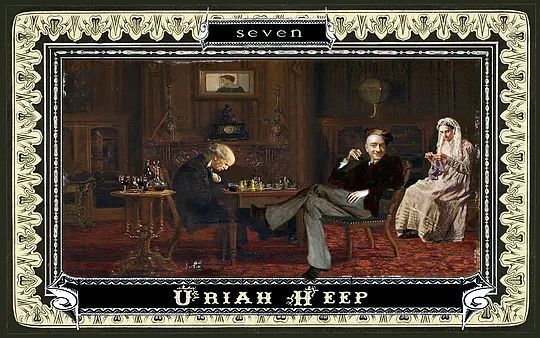



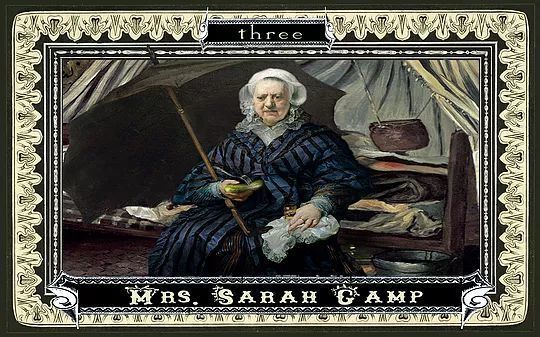


Coincidence yes. Lucky, not at all.